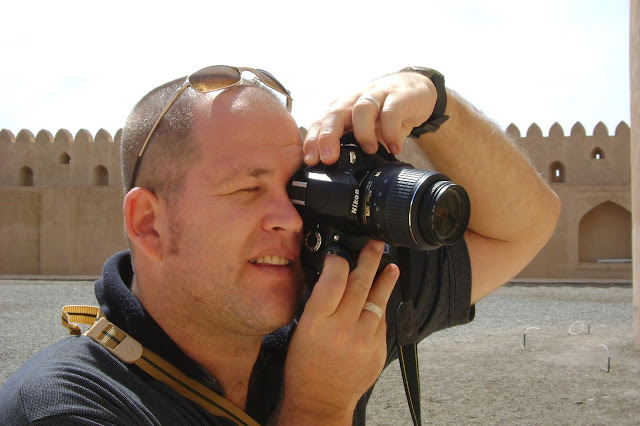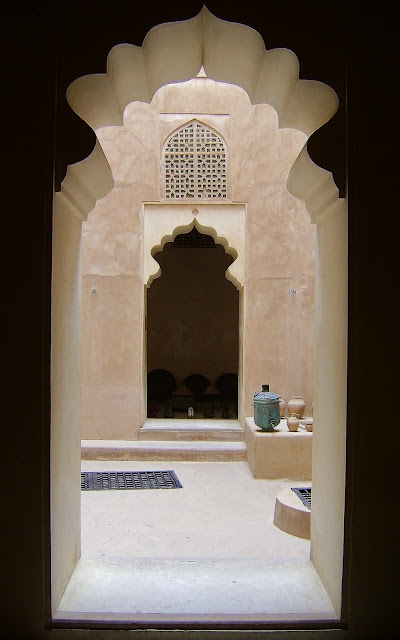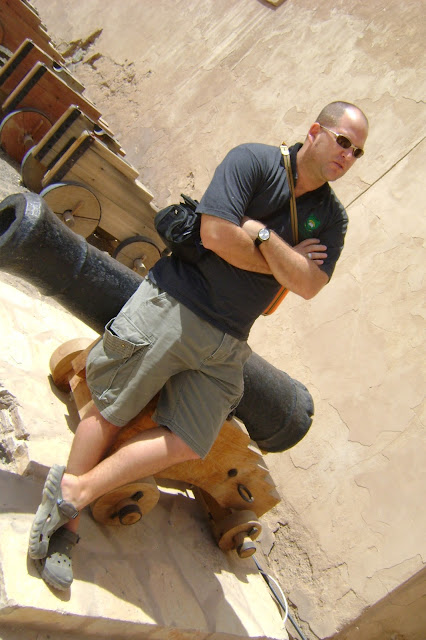English Teacher in Oman
Exploring Bahla, Nizwa & Jabrin
2008-2009
Background
During 2008 and 2009 I worked in The Sultanate of Oman as an English teacher at the Ibri College of Applied Sciences. Nizwa was the closest biggish town where one could find proper restaurants and hotels with swimming pools. It also has a fort and souq which one can visit and buy souvenirs from.
It is a very scenic town only about an hour and a half's drive from Ibri, excellent for day trips. One had to drive through Bahla en route to Nizwa, a one-horse town with a huge fort as a tourist attraction. It served as a rest point to eat something at one of the main street coffee shops. Meals at coffee shops in Oman mainly consist of bread, rice, chicken and junk food, extremely high in sugar and gluten.
Nizwa had a Pizza Hut, with food that we all knew and knew where it came from. We made a point to frequent the Al Falaj Daris hotel which had a great blue swimming pool. Nizwa's fort and souq is a well-known tourist attraction, great for shopping and the views of Nizwa from the top of the fort.
Near Nizwa is another well-preserved fort/castle fortification, the Jabrin castle surrounded by a date plantation. The fort/castle serves as a museum of Omani life of days gone by.
 |
| View of date plantations from the roof of Jabrin castle |
About Oman
Oman, officially the Sultanate of Oman, is an Arab country on the southeastern coast of the Arabian Peninsula. Holding a strategically important position at the mouth of the Persian Gulf, the country shares land borders with the United Arab Emirates to the northwest, Saudi Arabia to the west, and Yemen to the southwest, and shares marine borders with Iran and Pakistan. The coast is formed by the Arabian Sea on the southeast and the Gulf of Oman on the northeast. The Madha and Musandam exclaves are surrounded by the UAE on their land borders, with the Strait of Hormuz (which it shares with Iran) and the Gulf of Oman forming Musandam's coastal boundaries.
From the late 17th century, the Omani Sultanate was a powerful empire, vying with Portugal and Britain for influence in the Persian Gulf and the Indian Ocean. At its peak in the 19th century, Omani influence or control extended across the Strait of Hormuz to modern-day Iran and Pakistan, and as far south as Zanzibar (today part of Tanzania, also former capital). As its power declined in the 20th century, the sultanate came under the influence of the United Kingdom. Historically, Muscat was the principal trading port of the Persian Gulf region. Muscat was also among the most important trading ports of the Indian Ocean.
Oman is an absolute monarchy. The Sultan Qaboos bin Said al Said has been the hereditary leader of the country since 1970. Sultan Qaboos is the longest-serving current ruler in the Middle East, and sixth-longest current reigning monarch in the world.
Oman has modest oil reserves, ranking 25th globally. Nevertheless, in 2010 the UNDP ranked Oman as the most improved nation in the world in terms of development during the preceding 40 years. A significant portion of its economy is tourism and trade of fish, dates, and certain agricultural produce. This sets it apart from its neighbors’ solely oil-dependent economies. Oman is categorized as a high-income economy (Wikipedia).
 |
| Taking pics at Jibreen castle, near Nizwa |
About Bahla
Bahla is a UNESCO World Heritage Site town, located 40 km away from Nizwa, and about 200 km from Oman's capital Muscat which lies in the Ad Dakhiliyah region of Oman. It is notable as the home of one of the oldest fortresses in the country, the 13th-century Bahla Fort and the town's pottery.
The fortress and the town are enclosed by extensive remnants of a 12-km long fortified wall. Most buildings are constructed of traditional mud brick, many of them are hundreds of years old. The site is undergoing reconstruction sponsored by UNESCO (Wikipedia).
 |
| The 13th-century Bahla Fort built by mud |
 |
| The main street of Bahla at dusk |
 |
| Dinner at a coffee shop in the main street of Bahla |
About Jabrin
Jabrin is a small town in Ad Dakhiliyah Governorate in northeastern Oman. The town is known for its impressive castle, which was built by the Yaruba dynasty Bil'arab bin Sultan, who ruled from 1679 to 1692 (Wikipedia).
 |
| Jabrin castle - view from the roof |
 |
| Jabrin castle interior |
 |
| On the roof of Jabrin castle |
 |
| My wife at Jabrin castle |
 |
| My wife at Jabrin castle |
 |
| Jabrin castle roof |
 |
| Jabrin castle - Old cannon on display |
 |
| Jabrin castle roof |
 |
| Jabrin castle - water cistern |
About Nizwa
Nizwa is the largest city in the Ad Dakhiliyah Region in Oman and was the capital of Oman proper. Nizwa is about 140 km (1.5 hours) from Muscat. The population is estimated at around 72,000 people including the two areas of Burkat Al Mooz and Al Jabel Al Akhdar. Nizwa is one of the oldest cities in Oman and it was once a center of trade, religion, education, and art. Nizwa acquired its importance because it has been an important meeting point at the base of the Western Hajar Mountains.
Set amid a verdant spread of date palms, it is strategically located at the crossroads of routes linking the interior with Muscat and the lower reaches of Dhofar thus serving as the link for a large part of the country. Today, Nizwa is a diverse prosperous place with numerous agricultural, historical and recreational aspects. Nizwa is a center for date growing and is the market place for the area (Wikipedia).
 |
Having a swim at the Al Falaj daris hotel in Nizwa
|
 |
Just outside the Nizwa fort and souq area, a goat waiting for its owner
|
 |
| Steve, Baxter and Colette (friends and colleagues at Ibri) at the tourist part of Nizwa souq |
 |
| On the roof area of Nizwa fort |
 |
| View of Nizwa from the top of Nizwa fort |
 |
Taking an ice cream break near Nizwa fort.....excellent when one has to face the heat in the Gulf
|
 |
| My wife at a souvenir shop - Nizwa souq |
 |
| Steve with silver boxes for sale |
 |
| Omani Khanjars (daggers) for sale at Nizwa soug |
 |
| Souvenir camel - Nizwa souq |
 |
| Lunch in Nizwa - Humus and salad smiley face, created by Baxter |
 |
| Fresh produce market - Nizwa souq area |
 |
| Fresh produce market - Nizwa souq area |
 |
Goat outside the fresh produce market - Nizwa souq area
|
 |
Fresh produce market - Nizwa souq area
|
 |
| Nuts & Spices scale |
 |
| Nuts for sale at Nizwa souq |
 |
| Omani man on a scooter riding through the market |
 |
| Typical Indian manned coffee shop near the Nizwa souq |
To view my experiences as a teacher in Ibri, click here!


